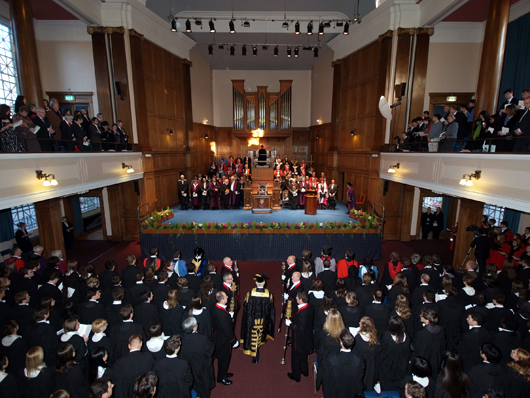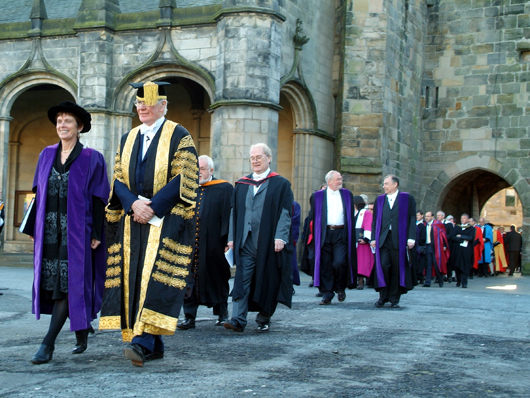St Andrew’s Day Graduation 2009 – opening address

The following address was delivered by the Principal and Vice-Chancellor Dr Louise Richardson during today’s Graduation ceremony.
Being More
Chancellor, Rector, ladies and gentlemen.
First and foremost, I would like to offer my warmest congratulations to those of you who are graduating from St Andrews today. I would also like, as a parent, to remind you that this is a big day for your families too. Please remember them and draw them into your celebrations.
At St Andrews we are proud of the breadth of subjects we study and teach, as reflected in the range of degrees that were conferred by the Chancellor this morning. The Foundation Bull in 1413 mentioned no fewer than five Faculties: Theology, Canon Law, Civil Law, Medicine and Arts. This afternoon we will be honouring a Nobel Prize winning Physicist, Sir Anthony Leggett. This morning, however, we have honoured one of our own, Scotland’s and St Andrews’ poet, Douglas Dunn. It seems a good opportunity, therefore, to remind ourselves of the role of the arts in university and public life.
Samuel Johnson has told us that “poetry is the art of uniting pleasure with truth.” Much the same could be said of university life, combining pleasure with the search for truth.
In a somewhat unlikely statement, the German philosopher, Friedrich Nietzsche, once said: “The most common form of human stupidity is forgetting what we were trying to do.”
What are we universities trying to do? As John Stuart Mill memorably said in his inaugural address as Rector of St Andrews in 1867: “Universities are not intended to teach the knowledge required to fit men for some special mode of gaining their livelihood. Their object is not to make skilful lawyers, or physicians or engineers, but capable and cultivated human beings.” Universities are not here simply to provide raw materials for the skills economy. Rather, universities generate understanding of where we have been, where we are, where we might go, and what it means to be human. The Arts are essential to that exploration.
Some state legislators in the US have recently objected to funding research “deemed unnecessary.” The claim that the Humanities do not serve a utilitarian purpose is rooted in the belief that human societies can be managed without regard for the very things that make them human. Societies are, in fact, shaped by their collective pasts as expressed and transmitted through the arts.
I speak as a social scientist, one who cares deeply about public policy, but it is inconceivable to me that wise public policy can be constructed without a foundation in the humanities. At a time when the most powerful countries in the world have encountered enormous difficulties in imposing their will on much weaker countries, it is worth asking, why? Perhaps a greater appreciation of the history, culture and world view of the populations of Iraq and Afghanistan, as expressed through their language, customs, histories and arts would have dictated a different policy and challenged the casual and exclusive reliance on superior force.
Looking at contemporary security issues, such as concern about Iranian acquisition of nuclear weapons: How can one evaluate how Iran sees itself, its role in the world and its relations with its neighbours, and hence the appeal of a nuclear arsenal, without reference to Iranian history, culture, language, arts and traditions?
In recent years western leaders have been surprised by the difficulties they have encountered in their well intentioned efforts to export democracy. But they have failed to appreciate that there is no better foundation on which to build democracy than the Humanities. They breed democratic values: questioning, complexity tolerance and empathy. Those of you who were present at Moshin Hamid’s lecture earlier this term will remember he posited empathy as the antithesis of evil.

The purpose of the humanities is to challenge assumptions and shake us out of our complacency. The economic, political and military failures of the past several years bear testament to the terrible costs of an unchallenged complacency. But who will challenge our assumptions if only those who share them are advanced?
The wordsmiths and those who study language can also help us to understand the evolving meanings of common words and how this reflects broader societal changes. Not long ago, for example, only teeth could be impacted. The term impact acquired a negative connotation as when nasty things exploded on impact. While today, impact appears to be emerging as a synonym for benefit, universal good, like motherhood and apple pie. The quality of our research is to be assessed by the scale of its impact on others, outside the university.
Anyone who has read Douglas Dunn’s poetry and the ineffable sadness of the sentiments he evokes, knows what impact is. Poetry like Dunn’s has a powerful impact on one’s emotions, one’s sense of what it means to be human. Though measuring that impact is likely to be quite a challenge! We must resist the emerging dominance of a way of reckoning value, that those things than can be quantified prevail over those that cannot, or as one of my former colleagues once put it more succinctly: If you cannot count it, it doesn’t count.
Terms like investing in human capital must never go unchallenged, notice what is modifying what here. Universities, as recipients of public funding, must be accountable to our political leaders and responsible in our expenditure of public funds but we must be far more than purveyors of raw materials to business. The human must trump the capital every time. So, let’s invest our capital in what makes us human.
The emphasis on the skills economy is understandable, especially in these straitened times. As one reads the history of the ancient Scottish universities, and especially the records of the 19th century educational Commissions, one realizes that the desire to ensure public benefit from public spending on education has a very long history in this country. Assessing the value of a poet has a long history in other countries too. In Mayakovsky’s poem, “Talking with the taxman about poetry” written in the Soviet Union in the 1920s, the poet says:
Our duty is
To roar
Like brass-throated sirens
In philistine fog
And in stormy weather…
Come, you smug dweller in the present era,
Buy your rail ticket
To Eternity
Here.
Calculate
The impact of verse
And distribute
All that I earn
Over three hundred years.
Even when, as now, we live in challenging times, our most immediate concerns must not be our only concerns. While we contend with the challenges of today we must retain both our memory which sustains us and our imagination which will light the way forward. Surely it is only by studying this world that we can hope to shape how it shapes us. We at universities have been privileged to have had access to a long time horizon, we must hold onto it.
The humanities, in short, teach us not what to do, but how to be. As you leave St Andrews today and go out into the world I hope you will remember us, but I also hope that you will try not to concentrate exclusively on having more or even on doing more but that you will make time to focus as well on being more.
Good luck!
Category University news